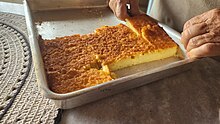Mané pelado (Portuguese: [mɐˈnɛ peˈladu] ; lit. 'Naked Mané') or bolo mané pelado is a Brazilian cake traditional to Goiás and the Center-West.[1] It consists of shredded yuca and coconut, and a salted cheese such as canastra cheese or minas cheese.[2] It can be found at regional Festa Juninas in Brazil.[2]
 Homemade mané pelado | |
| Type | Cake |
|---|---|
| Place of origin | Brazil |
| Region or state | Goiás |
| Main ingredients | Yuca, cheese, shredded coconut |
History
editThe exact origin of the cake is unknown, but there are several urban legends as to how it was created. Some stories tell of a farmer named Manoel or Mané who would sell this cake either shirtless or with an unbuttoned shirt,[3][4] whereas others claim that the dessert is named after a farmer named Mané who would harvest yuca while naked.[1][2][5][6] Another story tells that the cake is named in honor of a nearby farmer named Mané who provided the yuca used when the recipe was created.[7]
Researchers with Comer História (History of Eating), a project run by the College of Philosophy and Sciences at São Paulo State University, made the claim in 2023 that Mané pelado is a derivation of Manauê , a Brazilian cake from the colonial period that was adapted from a traditional indigenous Brazilian meal. It was created by the Portuguese after adding eggs, milk, sugar, and fat to an indigenous meal consisting of yuca dough baked in a banana leaf and baking it in a tray instead of in leafs. Mané pelado would have then been developed when coconut and cheese were added to Manauê. It would get its name from a gradual shift from Manauê to Manué to Mané, with pelado (naked) being added to the end as a reference to how the dessert would be baked in a pan rather than a banana leaf.[4]
See also
editReferences
edit- ^ a b Ledur, Júlia (9 December 2016). "De cueca virada a mané pelado: 13 comidas com nomes curiosos" [From cueca virada (inside-out underwear) to mané pelado (naked mané): 13 foods with curious names]. Gazeta do Povo (in Brazilian Portuguese). Retrieved 2023-09-06.
- ^ a b c Rossi, Mariane (24 June 2022). "'Mané pelado' é o típico bolo de mandioca ralada, que fica cremoso e perfeito para a festa junina; aprenda" ['Mané pelado' is a typical grated cassava cake that is creamy and perfect for Festa Junina; learn how]. G1 (in Brazilian Portuguese). Retrieved 2023-09-09.
- ^ Maciulevicius, Paula (21 December 2016). "Apelidado de mané pelado, bolo de mandioca é sensação em chácara de Piraputanga" [Nicknamed "mané pelado", cassava cake is a sensation at a farm in Piraputanga]. Campo Grande News (in Brazilian Portuguese). Retrieved 2024-03-08.
- ^ a b do Amaral Jorge, Marcos (28 June 2023). "Olhar histórico revela origens dos elementos tradicionais das festas juninas" [A historical look reveals the origins of the traditional elements of the Festa Juninas.]. Jornal da Unesp (in Brazilian Portuguese). Retrieved 2024-03-19.
- ^ Oliveira Santos, Thiara Augusta (13 February 2023). "Projeto Lendas: Mané Pelado" [Legends Project: Mané Pelado]. Territórios Gastronômicos (in Brazilian Portuguese). Retrieved 2023-09-06.
- ^ Saloméa, Raíra (22 July 2023). "Segredos do Mané Pelado" [Secrets of Mané Pelado]. Manzuá. Retrieved 2024-03-08.
- ^ Histórias & Receitas [Stories & Recipes] (PDF) (in Brazilian Portuguese). Fundación MAPFRE. 2012. pp. 95–96.